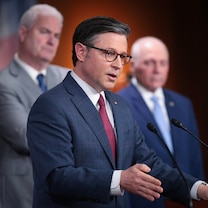Iraq War: Where the Candidates Stand
Obama and McCain's stances on the surge have evolved since the war's start.
Oct. 24, 2008— -- Few issues so clearly divide Barack Obama and John McCain as the war in Iraq. Their differences were stark even before the war began: Obama opposed it, McCain favored it.
Then there was the troop surge: Nobody pushed harder for sending additional troops than McCain. Obama didn't just oppose the surge, he proposed the opposite, calling for the withdrawal of troops.
But in a September 2008 interview with Bill O'Reilly, Obama acknowledged that the surge had worked.
"I think that the surge has succeeded in ways that nobody anticipated," Obama said. "I've already said it's succeeded beyond our wildest dreams."
Another difference lies in the candidates' vision for the war. McCain says he'll withdraw troops, but only if security continues to improve.
"If you set a date for withdrawal, regardless of conditions on the ground, then chaos, genocide results," McCain said.
For much of the campaign, the war in Iraq has been a signature issue for Obama, having opposed the war since the beginning. Obama has supported a strict timetable for withdrawing combat troops -- all out within 16 months.
But there has been some evolution in Obama's position. He recently said that he reserves the right to "pause" the withdrawal if conditions deteriorate, and he speaks with less certainty about his timetable than at the beginning of his campaign.
"We should end this war responsibly. We should do it in phases," Obama said in the first presidential debate at the University of Mississippi. "But in 16 months we should be able to reduce our combat troops ... provide some relief to military families and our troops and bolster our efforts in Afghanistan so that we can capture and kill bin Laden and crush al Qaeda."
Obama's discussion of Iraq only includes combat troops, not complete withdrawal. He says that he'd still keep troops in Iraq for training and counterterrorism operations.
"When you add up the troops that will be required to do that, you end up with probably 30,000 to 50,000 troops by 2010 and perhaps 20,000 to 30,000 troops by 2012," said John Nagl, a retired officer in the United States Army and counterinsurgency expert.




